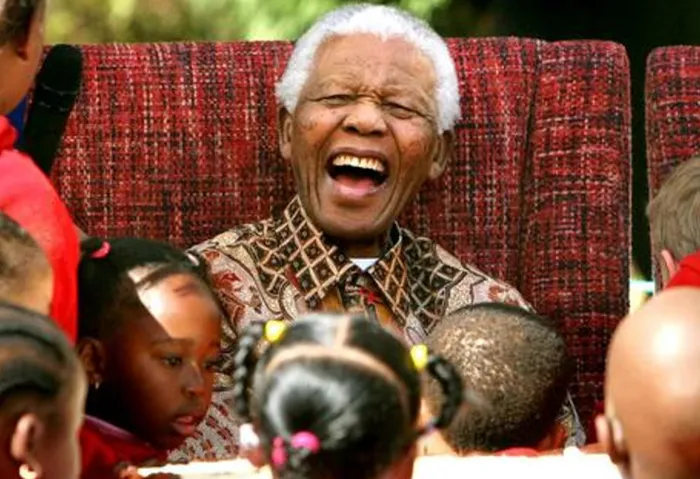Discerning leadership – we need more of it, now

Nelson Mandela provides an illustrative example of a discerning leader, says the author.
Image: File
It is hardly new news that the world is in a ‘polycrisis’; the causal entanglement of crisis in multiple global systems in ways that significantly degrade humanity’s prospects.
In the polycrisis, the world is confronted with a series of intricate and interconnected challenges that are unprecedented in modern history. Issues like climate change, the looming threat of nuclear conflict, a pandemic and a downturn in the global economy are all unfolding simultaneously.
In recent times, we have observed a troubling increase in the lack of leadership in organisations and institutions to deal effectively with these challenges, evidenced by the widespread moral failures, the growing number of corporate scandals and escalating societal ills, including rising intolerance, poverty and inequality, and the inability to make progress towards achieving the Global Sustainability Goals.
Leadership stands central to these challenges, as most of them are human-caused. Indeed, the polycrisis is a crisis of reactive and short-term focused leadership and the absence of discerning leadership. Discerning leadership entails leaders’ ability to perceive, understand and interpret complex situations and dynamics thoughtfully and insightfully and then to act appropriately. Discerning leadership involves a deep awareness of the nuances and underlying factors at play in any given scenario, allowing leaders to make informed, strategic decisions in the face of complexity rather than reacting impulsively.
Discerning leadership stands in stark contrast to the impulsive and reactive leadership, which often responds hastily to immediate challenges. The news is inundated with examples of impulsive and reactive leaders, such as Donald Trump. Trump typically makes emotionally driven or reactive decisions and threats on the spur of the moment, or decisions that are self-protective for his position and exclusive circle. This is clear in the way that Trump tends to impose tariffs, threatening Ukraine or supporting Putin and Russia’s invasion of Ukraine, only to make a 180-degree turnaround on his decisions soon after. Trump’s rallying cry to “drill, baby, drill” right after his inauguration as president acutely demonstrates his short-term vision as the most powerful leader in the world.
Locally, I find it difficult to understand how reactive missions by splinter factions to America to gossip one-sided perspectives about South Africa's situation on behalf of their exclusive group with the Trump government can contribute to sustainable national progress. Instead, such actions only serve to strengthen the Trump Mafia’s deranged ideas about South Africa and deepen the divides locally. Similarly, it is challenging to comprehend Mr Ramaphosa’s inconsistent reactions regarding Mr Whitfield and Dr Nobuhle Nkabane's behaviours. Or can his actions and omissions be ascribed to protecting his position and an exclusive group, at the cost of discerned courageous leadership to the long-term benefit of the nation?
In contrast to reactive leadership, discerning leaders take the time to analyse situations and consider multiple perspectives thoroughly. This approach nurtures more sustainable solutions that address root causes rather than merely treating symptoms.
Nelson Mandela provides an illustrative example of a discerning leader. He emerged as a discerning leader during one of the most turbulent and politically complex periods in South Africa's history, his name becoming synonymous with systemic reconciliation, peace, justice, and resilience. His journey as an activist in the ANC made him viewed by the Apartheid government as the number one enemy of the state. Yet, as South Africa's first black president, he became a person who was loved and respected by most South Africans.
A great example of Mandela as a discerning leader was his approach to the Springbok rugby team and the Springbok emblem 30 years ago in 1995, when the Rugby World Cup took place in South Africa. The World Cup spotlighted the Springbok emblem that was deeply rooted in apartheid history. Despite extensive resistance from the ANC due to the Apartheid associations of the Springbok emblem, his strategic insight in the face of this complexity presented him with the wisdom and courage to make the politically risky move to embrace and protect this symbol, even at the personal risk of being ousted by the ANC due to this decision. Even today, many people view Mandela as a sell-out because of what happened in 1995. But Mandela’s decision was not in vain. His discerning wisdom marked a significant step in South Africa’s journey towards reconciliation, nation-building and advancing interracial harmony. Indeed, 30 years later, the once Apartheid-associated Springbok team transformed into one of the most potent symbols of unity, hope and pride for all South Africans.
Another example of the benign influence of discerning leadership was the late Pope Francis, who made a significant contribution to humanity at large, even beyond the Catholic Church. Pope Francis's leadership in a highly complex and multifaceted context was marked by his focus on social justice, environmentalism, and reform within the Church. Similarly to Mandela, who faced opposition from many ANC members when supporting the Springbok emblem, Pope Francis faced resistance from conservative factions, who opposed his perspectives and actions, which were often contentious. Nevertheless, today he is remembered for his humility, courageous outreach to marginalised communities, and efforts to address complex and daunting issues such as the clergy sex abuse crisis.
The importance of discerning leadership in today's volatile, uncertain, complex, and ambiguous world cannot be overstated. Whether in the corporate world, politics, global stewardship, or education. More than ever before, we need leaders who prioritise understanding, collaboration and empathy, paving the way for actionable solutions to the multifaceted challenges of our time. We need leaders whose actions are rooted in deep presence and listening; leaders who can embrace and work with paradox, polarity and complexity rather than rushing to resolve issues with a short-term focus and simplistic cause-and-effect perspectives. In an increasingly polarised world, we need leaders such as Mandela and Pope Francis, who embody discernment and contribute to a brighter, more equitable future for all across divides. We need leaders who lead through honest and sincere dialogue, participation, and inclusion, and in ways that reorient traditional hierarchies toward relational and collective discernment.
So why do we see so few examples of discerning leadership? Acting as and being a discerning leader is not simple or easy, but requires insight, courage and wisdom. Indeed, as we can see from the vignettes about Nelson Mandela and Pope Francis, discerning leadership is quite often opposed by those with impulsive, simplistic and short-term benefit inclinations. Both these leaders had to act with courage in some hostile situations, risking their own personal futures. Standing up as a discerning leader requires the discomforting combination of conviction, courage and resilience, with remaining open-minded to new insights and perspectives. It requires continual reflection on who we are as leaders, what our purpose is, what the larger system requires from us for the long term, while resisting unduly impulsive and reactive urges, and then acting with courage to do the right thing.
Thirty years ago, the Springboks won the first of four Rugby World Cup titles, at least partly due to Mandela’s discerning leadership. Today, my plea and challenge to all individuals in leadership positions, whether political, industrial, educational, or elsewhere, is to reflect on the leadership you demonstrate – is it reactive, impulsive, and self-protective, or is it discerning? We all have a potential Donald Trump or even Hitler in us, but also the potential to be the next Nelson Mandela or Pope Francis. The leader we become does not depend on our position or affiliation, our status or control. Just consider what we can achieve as institutions and a nation, or what we can become if all of us demonstrate a bit more discerning leadership every day.

Mias de Klerk is a Professor in Leadership and Organisational Behaviour and Director at the Centre for Responsible Leadership Studies (Africa) at Stellenbosch Business School.
Image: Supplied
Mias de Klerk is a Professor in Leadership and Organisational Behaviour and Director at the Centre for Responsible Leadership Studies (Africa) at Stellenbosch Business School
BUSINESS REPORT